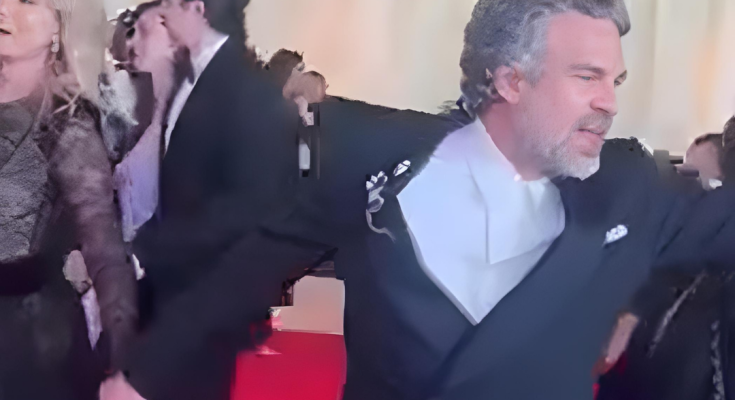The 96th Academy Awards, an event typically characterized by glitz, glamour, and seamless coordination, took a more politically charged turn when actor Mark Ruffalo used his arrival to spotlight an ongoing international issue. Ruffalo, an outspoken activist and advocate for human rights, showed his solidarity with pro-Palestinian protesters who staged a demonstration near the venue, temporarily delaying attendees, including himself.
As Ruffalo exited his vehicle on the red carpet, he raised his voice in support of the protesters, calling for attention to their cause. “These voices cannot be ignored!” he declared to the gathered media, his words resonating amidst the usual flashes of cameras and applause. “They are standing up for justice and human rights, and it’s our duty to listen.”
The pro-Palestinian protesters had organized a peaceful yet disruptive demonstration near the Oscars venue, aiming to draw attention to the plight of Palestinians and advocate for an end to violence and systemic injustices in the region. Chanting slogans, waving banners, and sharing their stories, the protesters sought to utilize the global spotlight of the Academy Awards to amplify their message. Their presence, while momentarily delaying the arrival of some high-profile attendees, succeeded in sparking conversations both inside and outside the event.
Ruffalo, who has been a vocal critic of various international policies and a consistent supporter of marginalized communities, saw the protest as an opportunity to underscore the importance of advocacy and activism. “These are not just political issues—they are human issues,” Ruffalo emphasized in a brief interview with reporters. “The world watches the Oscars, and if this platform can be used to amplify the voices of the oppressed, then so be it.”
His comments were met with a mix of praise and criticism. Social media quickly became a battleground of opinions, with some applauding the actor for standing in solidarity with the protesters and others questioning whether the Oscars was the right stage for such activism. Supporters of Ruffalo highlighted his consistent dedication to social justice causes and praised his courage in taking a stand during a high-profile event.
The protesters themselves expressed gratitude for Ruffalo’s acknowledgment. In a statement shared on social media, one of the organizers remarked, “Having influential figures like Mark Ruffalo support our cause helps shine a light on the struggles we face daily. We hope this sparks a greater dialogue about justice and peace in Palestine.”
The Academy Awards has historically served as a platform for political statements and social causes, from Marlon Brando’s boycott in 1973 to recent calls for diversity and equality in Hollywood. Ruffalo’s impassioned display fits into this tradition, further blurring the lines between art, activism, and global politics.
As the evening progressed, Ruffalo’s statement reverberated through the halls of the Dolby Theatre and beyond. While the focus eventually shifted back to the awards and the achievements of the film industry, the actor’s impromptu act of advocacy served as a reminder that the world’s stage—whether cinematic or real-life—remains an important space for raising awareness and fostering change.
In an era where celebrities are often criticized for remaining apolitical, Ruffalo’s actions demonstrated the power of using fame to champion meaningful causes. His moment of solidarity with pro-Palestinian protesters may have been brief, but it succeeded in ensuring that their message resonated far beyond the demonstration, capturing the attention of a global audience.

